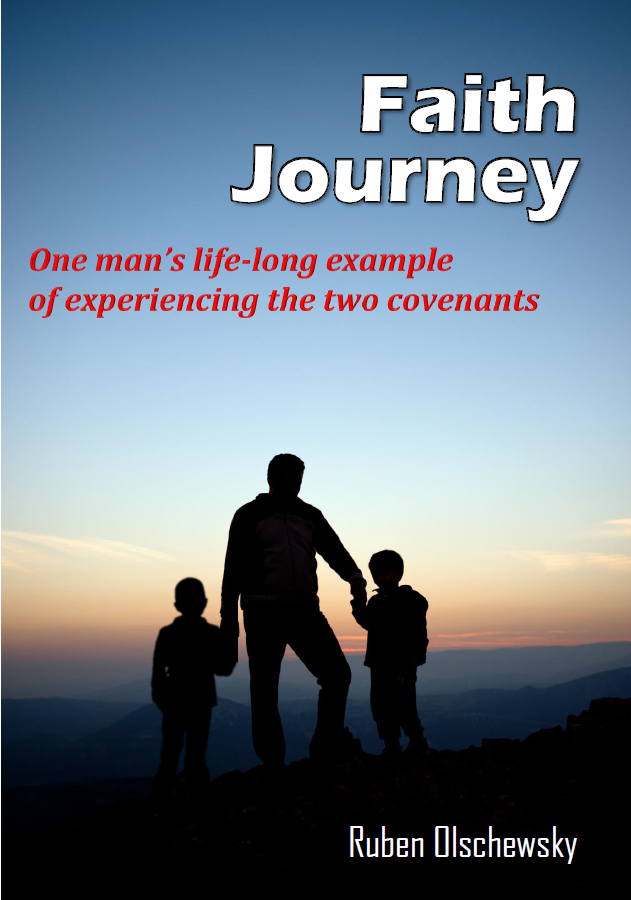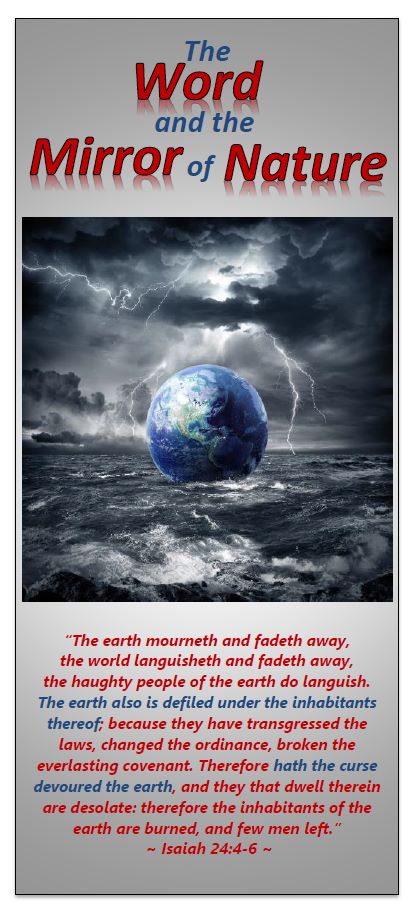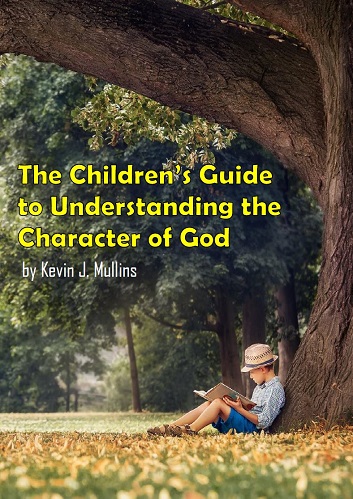(Numbers 11:1) Did God Consume the Complainers with Fire?
“Now when the people complained, it displeased the LORD; for the LORD heard it, and His anger was aroused. So the fire of the LORD burned among them, and consumed some in the outskirts of the camp.” (Numbers 11:1)
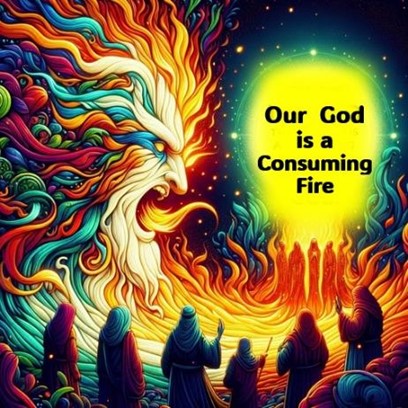 Let us lower our gaze from the abstract things of heaven and picture a father listening to his children complaining. We see him become angry to such an extent that he ignites a fire which leaves his complaining children engulfed in flames. Do we dare to maintain our gaze and look upon the faces of the children? Do we behold their realization that their value to their dad was so little that their dad not only contemplated burning them to death, but actually did it? Do we block our ears as they shriek in agony, their bodies melting away under the searing heat of the flames?
Let us lower our gaze from the abstract things of heaven and picture a father listening to his children complaining. We see him become angry to such an extent that he ignites a fire which leaves his complaining children engulfed in flames. Do we dare to maintain our gaze and look upon the faces of the children? Do we behold their realization that their value to their dad was so little that their dad not only contemplated burning them to death, but actually did it? Do we block our ears as they shriek in agony, their bodies melting away under the searing heat of the flames?
In the human realm, surely we must recoil in horror from such a ghastly thought. But how is it that the human mind banishes this horror when it looks into the heavenly realm? Somehow notions of divine justice extinguish the horror, silence the questioning looks, and seem to satisfy many into the belief that God burns His wicked children alive in His quest for justice.
Is it true that a change in God’s mood can turn Him into a fire breathing machine which exterminates those who displease Him? Why does it seem this way? Can we see in the text a reflection of our own face? Can we see the images of men and women in the dark ages tied to stakes and burnt alive in the name of religion?
We remind ourselves that in order to be certain that God acts in a certain way, we must look upon the face of Jesus in the Gospels to see if He took such an action. There is no such action recorded. In fact, we find the exact opposite.
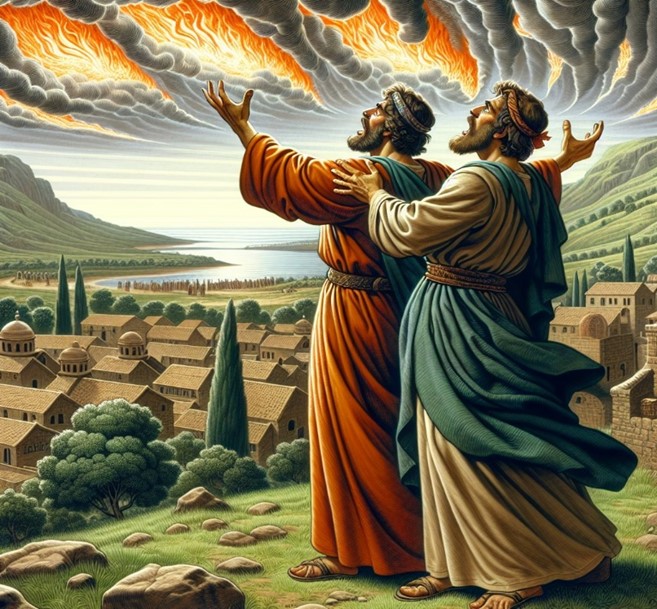 “Now it came to pass, when the time had come for Him to be received up [or, ‘to go up’, meaning to Jerusalem] that He steadfastly set His face to go to Jerusalem, and sent messengers before His face. And as they went, they entered a village of the Samaritans, to prepare for Him. But they did not receive Him, because His face was set for the journey to Jerusalem. And when His disciples James and John saw this, they said, ‘Lord, do You want us to command fire to come down from heaven and consume them, just as Elijah did?’ But He turned and rebuked them, and said, ‘You do not know what manner of spirit you are of. For the Son of Man did not come to destroy men’s lives but to save them.’ And they went to another village.” (Luke 9:51-56)
“Now it came to pass, when the time had come for Him to be received up [or, ‘to go up’, meaning to Jerusalem] that He steadfastly set His face to go to Jerusalem, and sent messengers before His face. And as they went, they entered a village of the Samaritans, to prepare for Him. But they did not receive Him, because His face was set for the journey to Jerusalem. And when His disciples James and John saw this, they said, ‘Lord, do You want us to command fire to come down from heaven and consume them, just as Elijah did?’ But He turned and rebuked them, and said, ‘You do not know what manner of spirit you are of. For the Son of Man did not come to destroy men’s lives but to save them.’ And they went to another village.” (Luke 9:51-56)
Even though James and John thought they had biblical support for their inquiry by referring to Elijah (2 Kings 1:9-14), Jesus rebukes them for, not only their attitude towards the Samaritans, but apparently for misunderstanding the story of Elijah. He did not say, “Now is not the right time for these things;” He said, “This is not My Spirit.” As we look deeper into the Greek of this word spirit, we see the following:
“G4151 pneuma. From G4154; a current of air, that is, breath (blast) or a breeze; by analogy or figuratively a spirit, that is, (human) the rational soul, (by implication) vital principle, mental disposition, etc., or (superhuman) an angel, daemon, or (divine) God, Christ’s spirit, the Holy spirit: – ghost, life, spirit (-ual, -ually), mind. Compare G5590.” (Strong’s Concordance)
Jesus tells the disciples that it is not His vital principle to burn people alive; it is not His mental disposition to consume those who disrespect Him. The implications of this statement of Jesus are so startling that it is not surprising that many translations do not include it. But I believe this is vital evidence of what God’s character is really like. If James and John could misunderstand what is written in Scripture, are we not in danger of doing the same?
The complete refusal of Jesus to destroy the Samaritans with fire, citing that it is against His Spirit to do this, is the key piece of the puzzle to show that God did not burn up the people in Elijah’s day, nor the Israelites in the edge of the camp. (Please see my article entitled, Didn’t God Send Fire Down From Heaven and Consume the Soldiers at the Command of Elijah?).
If Jesus is the revelation of the Father as He claims to be (John 14:9), then such ideas are impossible. This is why Paul pleads with us to allow Jesus to remove the veil of misunderstanding as we read these stories:
“But their minds were blinded. For until this day the same veil remains unlifted in the reading of the Old Testament, because the veil is taken away in Christ. But even to this day, when Moses is read, a veil lies on their heart. Nevertheless when one turns to the Lord, the veil is taken away.” (2 Corinthians 3:14-16)
Let us now set about to remove the veil covering our eyes and look into the face of the Son of God to bring this story into harmony with the revelation of Jesus Christ.
God’s Anger Was Aroused
We see in our story in question that, after the people began complaining, God’s “anger was aroused.” What happens when God’s anger is aroused? Does He lash out to cause harm? Does He inflict people with a disease? Does He torture them in some way? Actually, it is the opposite:
“And the Lord said to Moses: ‘Behold, you will rest with your fathers; and this people will rise and play the harlot with the gods of the foreigners of the land, where they go to be among them, and they will forsake Me and break My covenant which I have made with them. Then My anger shall be aroused against them in that day, and I will forsake them, and I will hide My face from them, and they shall be devoured. And many evils and troubles shall befall them, so that they will say in that day, ‘Have not these evils come upon us because our God is not among us?’” (Deuteronomy 31:17)
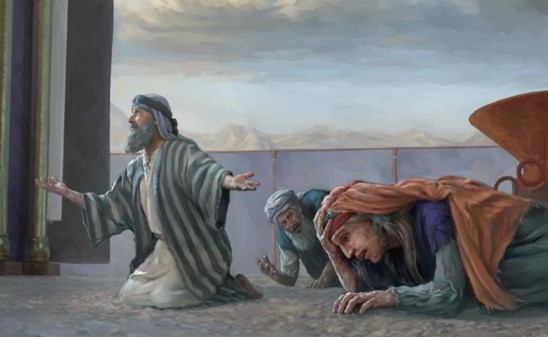 When God’s anger is aroused, He leaves! However, please know that He is not leaving in disgust, slamming the door behind Him; He is leaving at the sinner’s request. When we choose a different leader, God will not interfere with our free choice. Then, after He leaves, “they shall be devoured. And many evils and troubles shall befall them” because God is not among them. A similar situation happened later when Aaron and Miriam spoke against Moses and “the anger of the Lord was aroused against them, and He departed. And when the cloud departed from above the tabernacle, suddenly Miriam became leprous, as white as snow” (Numbers 12:9-10).
When God’s anger is aroused, He leaves! However, please know that He is not leaving in disgust, slamming the door behind Him; He is leaving at the sinner’s request. When we choose a different leader, God will not interfere with our free choice. Then, after He leaves, “they shall be devoured. And many evils and troubles shall befall them” because God is not among them. A similar situation happened later when Aaron and Miriam spoke against Moses and “the anger of the Lord was aroused against them, and He departed. And when the cloud departed from above the tabernacle, suddenly Miriam became leprous, as white as snow” (Numbers 12:9-10).
The Hebrew word for “devoured” in Deuteronomy 31:17 above is אָכַל (akal), which is the same word for “consumed” in our verse in question (Numbers 11:1). Let’s apply this understanding:
“Now when the people complained, it displeased the LORD; for the LORD heard it, and He left, forsook them, hid His face. So the fire of the LORD burned among them, and consumed [devoured] some in the outskirts of the camp [because He was not among them].” (Numbers 11:1)
The Fire of the LORD
The question now is, how can “the fire of the LORD” burn among them if God is not among them? This is where the book of Job is helpful.
In the first chapter of Job, we read, “Now there was a day when the sons of God came to present themselves before the Lord, and Satan also came among them” (Job 1:6). During this encounter, Satan accuses Job of only obeying God because of God’s protective hedge around him (Verse 10). In other words, Job is only serving God because things are going well for him now, but take away this protection, and then Job would be cursing God. Replying to this, God says, “Behold, all that he [Job] has is in your [Satan’s] power; only do not lay a hand on his person” (Verse 12).
All the calamities that come upon Job from that point on are from Satan. Since God will not interfere with our free choice, Job could have exercised his faith in God’s divine protection and Satan would have had to respect the hedge of protection that God had built up around Job. However, Job’s fear and worry that bad things would happen to him and his family (Job 1:5) indicated a lack of faith in God. Therefore, Satan gained access into Job’s life due to Job’s own fears. After calamity struck, Job confessed:
 “For the thing which I greatly feared is come upon me, and that which I was afraid of is come unto me. I was not in safety, neither had I rest, neither was I quiet; yet trouble came.” (Job 3:25-26)
“For the thing which I greatly feared is come upon me, and that which I was afraid of is come unto me. I was not in safety, neither had I rest, neither was I quiet; yet trouble came.” (Job 3:25-26)
Here’s how it reads in the Septuagint (the Greek translation of the Hebrew Scriptures):
“For the terror of which I meditated has come upon me, and that which I had feared has befallen me. I was not at peace, nor quiet, nor had I rest; yet wrath came upon me.”
Because of meditating solely on his fear, he walked out from under God’s protective hedge, thus God’s wrath (anger) was aroused. God’s wrath was not executed by God lashing out at Job to cause him harm, but by God departing, leaving Job to reap the natural consequences he had sown.
In Job 2:16, we read that fire burned up all of Job’s sheep and servants. Clearly, Satan caused this fire, but notice what one servant says to Job:
“The fire of God fell from heaven and burned up the sheep and the servants, and consumed them; and I alone have escaped to tell you!” (Job 2:16)
The people living during this event, who did not know what we know was happening behind the scenes, perceived that the fire came directly from God; this is Satan’s goal.
“‘Blame God’ is the devil’s subterfuge: and how many thousands of Christians today attribute to God what Satan is doing. If calamity comes to them, they say ‘it is God’s hand,’ and they either passively yield or else they rebel, with the result that the heart is heavy and the spirit dulled and oppressed.” (Charles H. Usher, Satan: A Defeated Foe, p. 53)
Just as these calamities came upon Job due to His fear, the people in the camp had witnessed God descend upon Mt Sinai, which aroused their fear:
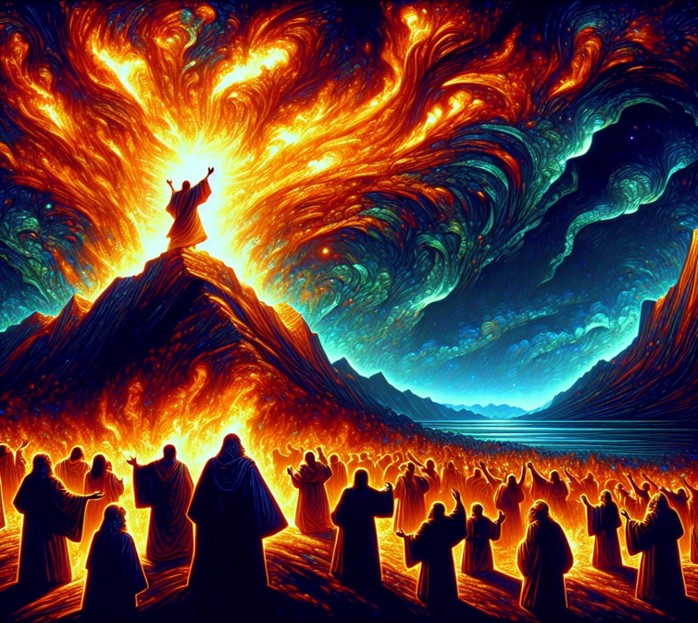 “Now all the people witnessed the thunderings, the lightning flashes, the sound of the trumpet, and the mountain smoking; and when the people saw it, they trembled and stood afar off. Then they said to Moses, ‘You speak with us, and we will hear; but let not God speak with us, lest we die.’” (Exodus 20:18-19)
“Now all the people witnessed the thunderings, the lightning flashes, the sound of the trumpet, and the mountain smoking; and when the people saw it, they trembled and stood afar off. Then they said to Moses, ‘You speak with us, and we will hear; but let not God speak with us, lest we die.’” (Exodus 20:18-19)
Why did they think they would die?
“The sight of the glory of the Lord was like a consuming fire on the top of the mountain in the eyes of the children of Israel.” (Exodus 24:17)
God had told them to “listen to My voice” (Exodus 19:5, Legacy Standard Bible), but they refused because of how they perceived God to be. The thunder, the lightning (fire), and the earthquake were all manifestations through nature of Israel’s conceptions of God. Years later we see the same, when Elijah, upon the very same Mountain, was confronted with God’s glorious presence:
“… And, behold, the LORD passed by, and a great and strong wind rent the mountains, and brake in pieces the rocks before the LORD; but the LORD was not in the wind: and after the wind an earthquake; but the LORD was not in the earthquake: And after the earthquake a fire; but the LORD was not in the fire: and after the fire a still small voice.” (1 Kings 19:11-12)
 As God comes close to His people, their perceptions of deity are manifested through the elements of nature. Their internal thoughts are mirrored back to them through the same elements by which they were created. Because these elements begin to destroy as they come into the presence of God, the human heart projects the responsibility for these calamities onto God as part of His character, and ignores or denies them as a reflection of their own character. Referring to this account of Elijah, Albert Barnes writes, “The teaching is a condemnation of that ‘zeal’ which Elijah had gloried in, a zeal exhibiting itself in fierce and terrible vengeances …” (Barnes’ Notes, 1 Kings 19:12).
As God comes close to His people, their perceptions of deity are manifested through the elements of nature. Their internal thoughts are mirrored back to them through the same elements by which they were created. Because these elements begin to destroy as they come into the presence of God, the human heart projects the responsibility for these calamities onto God as part of His character, and ignores or denies them as a reflection of their own character. Referring to this account of Elijah, Albert Barnes writes, “The teaching is a condemnation of that ‘zeal’ which Elijah had gloried in, a zeal exhibiting itself in fierce and terrible vengeances …” (Barnes’ Notes, 1 Kings 19:12).
Just as God desired the Israelites to put away their preconceived ideas and listen to His voice, He revealed to Elijah that He is not in these destructive elements, but in “the still small voice”, or as the International Standard Version says, “the sound of a gentle whisper.”
Throughout their wilderness journey, the people constantly feared God was going to kill them (Exodus 16:3; 17:3; Numbers 16:13). Because of this, God tearfully gave them over to their own thoughts:
“And the Lord spoke to Moses and Aaron, saying, ‘How long shall I bear with this evil congregation who complain against Me? I have heard the complaints which the children of Israel make against Me. Say to them, As I live, says the Lord, just as you have spoken in My hearing, so I will do to you: The carcasses of you who have complained against Me shall fall in this wilderness …” (Numbers 14:26-29)
Keep in mind, the phrase “so I will do to you”, is a Hebrew idiom meant to be understood as God permitting the thing to take place. All throughout Scripture we read this Hebraic idiom where the Lord is said to “do” that which He reluctantly and tearfully “permits.”
“In the language of scripture, natural consequences are sometimes spoken of as though they were pre-ordained and irrevocable decrees. What happens solely through the permission of the Almighty, in the ordinary course of his Providence, is described as though it had taken place through some special and irresistible intervention of his hand. This is a mode of writing peculiar to the Hebrew idiom; an idiom which prevails everywhere throughout the New Testament, as well as the Old. Thus, when the sacred writers represent God as ‘blinding the eyes of men that they should not see, and hardening their hearts that they should not understand;’ their meaning generally is that he does not powerfully interfere to prevent those evils which are the natural fruits of our own folly, perverseness, and impenitence.” (John Goodge Foyster, Sermons; p. 90, 1826)
In their Biblical Commentary on the Old Testament, Carl Friedrich Keil and Franz Delitzsch write, “‘Fire of Jehovah:’ a fire sent by Jehovah, but not proceeding directly from Him, or bursting forth from the cloud, as in Leviticus 10:2.* Whether it was kindled through a flash of lightning, or in some other such way, cannot be more exactly determined.” (*Note, we’ll briefly discuss what happened in Leviticus 10:2 in a bit).
Is it really that much of a stretch to believe that, like Job, due to their complaining, God left them alone and they were not in safety (under His protective hedge) and therefore the thing which they feared came upon them. They had repeatedly feared that God was going to kill them ever since they perceived Him as a violent and destructive “consuming fire” on the Mount. Thus, they attributed the fire (the consuming) as being directly from God. Afterall, doesn’t Paul tell us that all those complainers in the wilderness were not directly destroyed by God, but by the Destroyer— ὀλοθρευτής (olothreutés), which means “venomous serpent” (1 Corinthians 10:10; Cf. Revelation 12:9)?
The Outskirts of the Camp
In Clarke’s Commentary on the Whole Bible, Adam Clarke writes, “it is possible that the mixed multitude occupied the outermost parts of the camp, consequently the burning might have been confined to them.” The “mixed multitude” refers to a multi-ethnic group of people who came out from Egypt along with the Israelites (Exodus 12:38). They were possibly mercenaries who, seeing that Egypt was about to be destroyed, took the opportunity to leave with the Israelites. They may also be men and women who had intermarried with the Israelites.
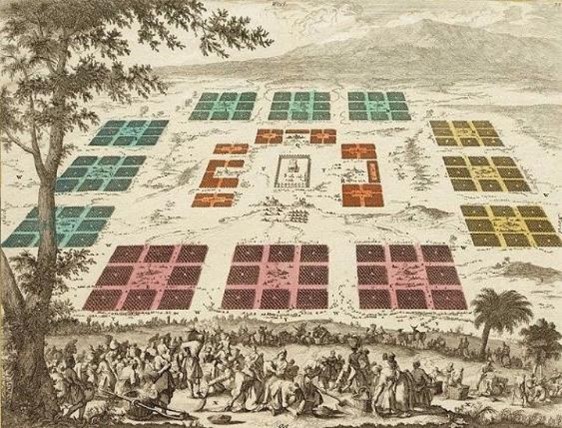 In Benson’s Commentary on the Old and New Testament, Joseph Benson suggests that the reason why the fire was sent into “the outskirts of the camp” was “Either because the sin began there among the mixed multitude, or in mercy to the people, whom he would rather awaken to repentance than destroy; and therefore he sent it into the skirts, and not the midst of the camp.”
In Benson’s Commentary on the Old and New Testament, Joseph Benson suggests that the reason why the fire was sent into “the outskirts of the camp” was “Either because the sin began there among the mixed multitude, or in mercy to the people, whom he would rather awaken to repentance than destroy; and therefore he sent it into the skirts, and not the midst of the camp.”
I find Benson’s comment interesting because the word “some” (in the phrase, “consumed some in the outskirts of the camp”) found in many translations of Numbers 11:1 is not in the Hebrew. The reason why they’ve added it is because this mixed multitude is mentioned again in verse 4 where they are found lusting for flesh food, despising the God-given manna which represented Jesus (John 6:31-35). This could mean that when it says, “the fire of the LORD burned among them”, it did not really burn any of the people, but simply “consumed the outskirts of the camp.” In fact, notice some of these alternate translations:
- English Standard Version: “The fire of the LORD burned among them and consumed some outlying parts of the camp.”
- Berean Standard Bible: “Fire from the LORD blazed among them and consumed the outskirts of the camp.”
- American Standard Version: “Jehovah burnt among them, and devoured in the uttermost part of the camp.”
- Contemporary English Version: “He destroyed the outer edges of their camp with fire.”
Keil and Delitzsch write, “At this His wrath burned, inasmuch as the complaint was directed against Him and His guidance, ‘so that fire of Jehovah burned against them, and ate [i.e., consumed] at the end of the camp.’ בּ בּער [burned against] signifies here, not to burn a person (Job 1:16), but to burn against” (Keil and Delitzsch OT Commentary, words in brackets added). However, this commentary also gives an alternative which we’ll see in a bit. Here’s a couple other Commentaries on this point:
“The text does not make clear what was burnt on this occasion, whether it was just shrubs near the tents, or some of the tents themselves. However, the people realized the danger they were in and appealed to Moses to pray for them.” (Gordon J. Wenham, World Biblical Commentary, Numbers 11:1)
“It is not clear whether the fire (lightning?) that God sent killed some of the people or only burned up things such as bushes and tents.” (Dr. Constable's Expository Notes)
Since the word “some” was added, and it appears that the people may not have been physically consumed, this has led some to believe that God permitted the fire “to arouse and terrify the body of the people, and bring them to repentance, who might fear it would proceed and go through the whole camp” (Gill’s Exposition of the Entire Bible). I do not believe this would mean that God was causing the fear, but through this fire, He was magnifying their sin, which aroused the fear they already possessed. In other words, He was permitting their sin to abound in order that His grace might much more abound (Romans 5:20). By revealing to them that He has been their protector all this time, He is heaping “coals of fire upon their heads” in hopes that their hearts (conscience) will melt (be pricked) and they will call out to Him (Romans 12:20), which is exactly what happened.
“Then the people cried out to Moses, and when Moses prayed to the LORD, the fire was quenched.” (Numbers 11:2)
The mixed multitude ended up being a major hindrance for the Israelites. Whenever things seemed to be going wrong, they always persuaded the Israelites by saying things like, “Would it not be better for us to return to Egypt?” (Numbers 14:3). Since their hearts were still in Egypt, God condescended to meet them where they were in their false understanding of Him and His methods. In doing so, He gave them over to the Egyptian method of submission through fear because at this stage in their journey it was the only method that would awaken them to their sin.
“The People Are Evil”
As noted earlier, although Keil and Delitzsch suggest that the fire did not burn any person, they also concede that “There is not sufficient ground for the supposition that the fire merely seized upon the bushes about the camp and the tents of the people, but not upon human beings. All that is plainly taught in the words is, that the fire did not extend over the whole camp, but merely broke out at one end of it, and sank down again, i.e., was extinguished very quickly, at the intercession of Moses; so that in this judgment the Lord merely manifested His power to destroy the murmurers, that He might infuse into the whole nation a wholesome dread of His holy majesty” (Keil and Delitzsch OT Commentary).
So, it is very possible that “the fire of the LORD” did in fact consume some of the mixed multitude and they died. However, the source of the “consuming” may be something different from what we may perceive. First, let’s look at the literal translation of our verse in question:
“And the people is evil, as those sighing habitually in the ears of Jehovah, and Jehovah heareth, and His anger burneth, and the fire of Jehovah burneth among them, and consumeth in the extremity of the camp.” (Numbers 11:1; Young’s Literal Translation)
When we read the literal Hebrew, the first thing we notice is that the people were acting in an evil manner through their complaining. The Literal Standard Version also echoes this by saying, “And the people are evil.” So, this is not a simple complaint; it is something evil and maybe even violent that they are thinking, saying, or doing (or even all three). What does Scripture say about evil when it comes to the destruction of the wicked?
“Evil shall slay the wicked, and those who hate the righteous shall be condemned.” (Psalm 34:21)
Here we read that it is evil that will directly slay the wicked, not God! It was the people’s own evilness, which was arousing self-condemnation that was consuming them! John Gill writes, “Jarchi [mediaeval French rabbi, also known as Rashi] says, the word [complained, caph] signifies taking an occasion, and that the sense is, that these men sought an occasion how to separate from the Lord; they wanted to return to Egypt again, that was what they were meditating and contriving; so the Targum of Jonathan [an Aramaic Translation], ‘and the ungodly of the people were in distress, and intended and meditated evil before the Lord” (Gill’s Exposition of the Entire Bible, words in brackets added).
The complainers “sought an occasion how to separate from the Lord.” We get a look into their thought process from the book of Psalms:
“Why do the nations rage, and the peoples plot in vain? The kings of the earth take their stand and the rulers gather together, against the LORD [God/The Father] and against His Anointed One [Son/Jesus]: ‘Let us break Their chains and cast away Their cords.’” (Psalm 2:1-3, Berean Standard Bible, words in brackets added)
Since God never interferes with our free choice, He gave them over to their own desires by permitting them to break the chains and separate themselves from Him. However, by doing so, they stepped out from under His protective hedge and were consumed. Notice how the prophet Isaiah explains this process:
“And there is no one who calls on Your name, who stirs himself up to take hold of You; for You have hidden Your face from us, and have consumed us because of our iniquities.” (Isaiah 64:7, New King James Version)
In this translation, we definitely see the connection between God hiding His face (i.e., departing/permitting the separation) and people being consumed, however, the phrase “because of our iniquities” is translated slightly inaccurately as can be seen in these alternate translations:
- American Standard Version: “thou hast hid thy face from us, and hast consumed us by means of our iniquities.”
- English Standard Version: “for you have hidden your face from us, and have made us melt in the hand of our iniquities.”
- Amplified Bible: “For You have hidden Your face from us and have handed us over to the [consuming and destructive] power of our wickedness [our sin, our injustice, our wrongdoing].” (Note: words in brackets in original).
- New Century Version: “That is because you have turned away from us and have let our sins destroy us.”
Clearly, the people are being “consumed” by their own iniquities for “The one who sows to please his flesh, from the flesh [not God] will reap destruction” (Galatians 6:8). “But each person is tempted when he is lured and enticed by his own desire. Then desire when it has conceived gives birth to sin, and sin [not God] when it is fully grown brings forth death” (James 1:14-15). The people desired to break free, and in justice God gave them what they desired for “The LORD is known by the justice He brings; the wicked are ensnared by the work of their own hands” (Psalm 9:16).
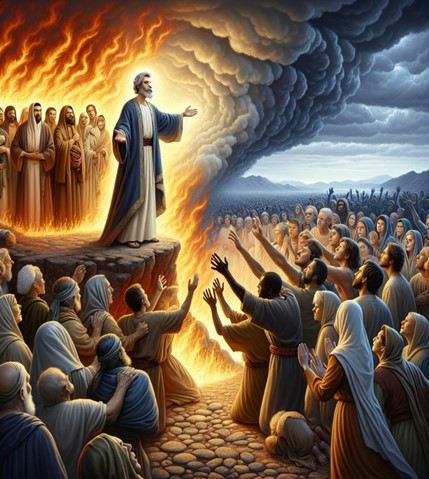 We must also remember that this fire was quickly quenched (Numbers 11:2). The fire was quenched when the people cried out and Moses prayed to the Lord. Although it does not last long, we have a submitting, or a quieting down, from the mixed multitude; when their anger subsides, so does the “fire.” Therefore, the anger of the people is directly connected to this fire. Again, the prophet Isaiah tells us the same:
We must also remember that this fire was quickly quenched (Numbers 11:2). The fire was quenched when the people cried out and Moses prayed to the Lord. Although it does not last long, we have a submitting, or a quieting down, from the mixed multitude; when their anger subsides, so does the “fire.” Therefore, the anger of the people is directly connected to this fire. Again, the prophet Isaiah tells us the same:
“For wickedness burns as the fire; it shall devour the briers and thorns, and kindle in the thickets of the forest; they shall mount up like rising smoke. Through the wrath [departure] of the Lord of hosts the land is burned up, and the people shall be as fuel for the fire; [why?] no man shall spare his brother.” (Isaiah 9:18-19, words in brackets added)
Just as those in the end will act as “fuel for the fire” as their hatred, strife, and violence burn towards one another, the evil complaining (hatred, strife, and violence) of the mixed multitude acted as “fuel for the fire.”
Did the Fire Literally Burn and Consume the People Alive?
We have seen by the testimony of Jesus that the thought of God intentionally torturing people by burning them alive is foreign to His character. This is why it is so important to study these stories through the eyes of Jesus. As briefly mentioned earlier, many teachers compare this incident with the story of the fate of Nadab and Abihu in Leviticus chapter 10.
“Then Nadab and Abihu, the sons of Aaron, each took his censer and put fire in it, put incense on it, and offered profane fire before the Lord, which He had not commanded them. So fire went out from the Lord and devoured them, and they died before the Lord.” (Leviticus 10:1-2)
The problem is, like James and John, due to their erroneous preconceived ideas concerning God’s character, these teachers use this story as proof that God will burn people alive. Yet pay special attention to verse 5 that says, after they were devoured or consumed by the “fire of the LORD”, they were carried out of the sanctuary tent still in their clothes:
“Then Moses called to Mishael and Elzaphan, the sons of Aaron’s uncle Uzziel, and said to them, ‘Come near, carry your relatives away from the front of the sanctuary to the outside of the camp. So they came near and carried them still in their tunics to the outside of the camp, as Moses had said.” (Leviticus 10:4-5, Legacy Standard Bible)
If this was literal combustible fire that God had reigned down upon them, it mysteriously bypassed their clothing and only burnt up their bodies! Therefore, to use this story as proof that God directly burns people alive with literal fire is simply irrational. What was being “consumed” or “devoured” when the Lord left them alone was their convicted (tormented) conscience. This is what Scripture means when it says the lost are “tormented with fire.” The Greek word for “tormented” in this context is βασανίζω (bansanizo) meaning, “To test the purity of metals such as gold and silver by rubbing them upon a touchstone.” The “torment” that the lost will experience is not merely physical pain, but intense mental anguish caused by a refusal to repent which magnifies self-condemnation. Please see my article entitled, Doesn’t the Bible Say That God Will Burn and Torture People “Forever and Ever”? for a deeper look at this.
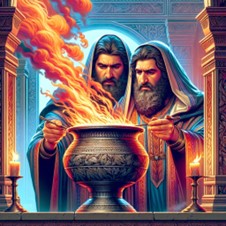 Take note that their own way was brought back upon their own heads. They were offering “strange fire” and thus it was “fire from the LORD” which devoured them. Again, we see that when God’s wrath is aroused, He leaves the people to reap what they themselves have sown— “‘So I have poured out My indignation on them; I have consumed them with the fire of My wrath; [how?] I have brought their own way upon their heads,’ declares the Lord GOD” (Ezekiel 22:31, words in brackets added).
Take note that their own way was brought back upon their own heads. They were offering “strange fire” and thus it was “fire from the LORD” which devoured them. Again, we see that when God’s wrath is aroused, He leaves the people to reap what they themselves have sown— “‘So I have poured out My indignation on them; I have consumed them with the fire of My wrath; [how?] I have brought their own way upon their heads,’ declares the Lord GOD” (Ezekiel 22:31, words in brackets added).
Nadab and Abihu reacted in fear, not trusting in God’s everlasting mercy, and were devoured by their mental anguish of guilt and shame they were holding onto. As Jesus said, “People will die of fright in anticipation of what is coming upon the world” (Luke 21:26, New American Bible).
However, unlike Nadab and Abihu, the mixed multitude, being quickly convicted (consumed/tormented) of this, cried out to God, and the “fire” was quenched as their complaining (evil) was quenched. This is why we are able to read about the mixed multitude again when they cried out for flesh food.
Was the “Fire” Literal?
One online source says this:
“The nature of this ‘fire’ is unknown. If it was literal fire, it could have been in the form of lightning. This would make sense since the LORD's presence was in the form of a cloud (Exodus 13:21; Numbers 9:16; Job 37:11). On the other hand, fire could be a symbolic reference to the LORD's wrath. Fire is often used in scripture to indicate judgment … It is also not clear whether people were killed by literal fire or something else.” (thebiblesays.com)
I personally believe there was both a literal and symbolic element here. Remember the verse above in Isaiah that describes both “the land is burned up, and the people shall be as fuel for the fire.” As briefly mentioned earlier, it is a biblical fact that man’s sin and violence is often reflected back by nature (Genesis 3:17-18; 4:10-12; Leviticus 18:25-28; Isaiah 24:4-6; Romans 8:22). Just as physical thorns and thistles appeared on the ground due to Adam’s sin, we see this in the case of the Flood as the earth responds to man’s violence with violence (Genesis 6:5, 11-12). We also see this in Sodom and Gomorrah as the land, which was “full of asphalt pits” (Genesis 14:10), erupts with fire and brimstone reflecting the men’s “lust” which “burned for one another” (Romans 1:27), thus becoming “an example to the ungodly” (2 Peter 2:6). Likewise, the hatred, strife, and violence that erupts among the followers of Satan after the Millennium is reflected by the elements of the earth being burned up (2 Peter 3:10-11). For more details concerning this concept, please see my articles:
- Did God Really Drown Millions of People in the Flood?
- Did God Send Angels to Kill the Inhabitants of Sodom and Gomorrah?
- What Does the Bible Mean When it Says People Will “Go into Hell … Where Their Worm Dieth Not, and the Fire is not Quenched"?
But was it a literal fire that broke out among the camp? It’s very possible, and most likely from a lightning bolt. Just as a physical wind, earthquake, and fire reflected Elijah’s sinful state, the fiery torment (i.e., mental anguish) of mind and soul erupting in their evil complaining was physically reflected by this fire. This concept is shown in Psalm 39:3, which talks about people who have pent-up wrath (murmurings/complaints) from within:
“My heart was hot within me; while I was musing, the fire burned. Then I spoke with my tongue.” (Psalm 39:3)
Here’s what Adam Clarke says:
“While I was musing— What was at first a simple sensation of heat produced a flame; the fire broke out that had long been smothered. It is a metaphor taken from vegetables, which, being heaped together, begin to heat and ferment, if not scattered and exposed to the air; and will soon produce a flame, and CONSUME THEMSELVES and every thing within their reach.”
This also echoes what God said to Satan after his fall: “I have brought fire from the midst of you; it has consumed you, and I have turned you to ashes on the earth in the eyes of all who see you” (Ezekiel 28:18, New American Standard Bible, 1995). How did God bring fire from within him? Because of sin being conceived in his heart, Satan’s mind was constantly agitated by God’s perfect righteousness. Thus, a sinful jealousy kindled from within him until he was in open rebellion.
The author of Hebrews also speaks of this concept when he says, “For the earth which drinks in the rain that often comes upon it, and bears herbs useful for those by whom it is cultivated, receives blessing from God; but if it bears thorns and briers, it is rejected and near to being cursed, whose end is to be burned” (Hebrews 6:7-8). This is a warning to all that if we reject what Jesus revealed about God, we reject the love and forgiveness of God. If we reject this, then there is nothing left but inner turmoil of fiery jealousy and indignation which will consume us from within. The author of Hebrews is not speaking about some eternal fiery fate that God imposes upon the unbeliever by burning and torturing them for eternity; he’s speaking of the inner psychological turmoil that comes from having an incorrect view of God. He speaks of the same in Hebrews 10:29,31,39.
Concerning Pharaoh, God said to Moses, “When you go back to Egypt, see that you do all those wonders before Pharaoh which I have put in your hand. But I will harden his heart, so that he will not let the people go” (Exodus 4:21). Cleary, God wasn’t purposefully (forcefully) manipulating Pharaoh’s heart and mind, but the wonders that God did before Pharaoh agitated his sinful heart causing him to retaliate in vengeful hate towards God and His people. After every sign that God performed, it is written: “Pharaoh hardened his heart at this time also; neither would he let the people go” (Exodus 8:32).
Just as Pharaoh’s heart being hardened led to his own demise, Satan’s fiery pent-up anger, which has consumed him, will eventually work against him and bring him “to ashes on the earth in the eyes of all who see [him].” The same fate awaits his followers, “For they shall be ashes under the soles of your feet” (Malachi 4:3).
God’s Protective Presence Removed = Man Consumed by Fire
On pages 34-36, in his book, The Lake of Fire and the Second Death, Ray Foucher gives a great visual of what happens when man rejects the presence of God and His Son. Ray points out that the Hebrew word for “man” (as distinct from “woman”, not “mankind” in general) is pronounced “ish” and appears in Hebrew letters like this: איש. The Hebrew letters, reading right to left, are aleph, yod, shin. To the Hebrew mind, the “yod” in the middle carries the meaning of “the right hand of God— the Messiah.” What is astonishing is, when you remove the yod from the midst of the word “man” (i.e., remove the Messiah from man), we are left with the Hebrew word for “fire”— אש.
 Now, as Ray also points out in his book, a similar thing happens with the word for “woman”, which is: אִשָׁה. Reading from right to left, it is spelled: aleph, shin, hey. Although the Hebrew letter yod (representing the Messiah) is not present, when you remove the letter, hey, we again are left with the word, “fire”— אש. Here’s what Ray concludes:
Now, as Ray also points out in his book, a similar thing happens with the word for “woman”, which is: אִשָׁה. Reading from right to left, it is spelled: aleph, shin, hey. Although the Hebrew letter yod (representing the Messiah) is not present, when you remove the letter, hey, we again are left with the word, “fire”— אש. Here’s what Ray concludes:
“The letters ‘yod’ and ‘hey’ that have been removed from the words for man and woman respectively, when combined as yod-hey, make the word ‘Yah,’ (spelled ‘Jah’ in KJV; Psalm 68:4) which is the poetic form of God’s name. I already mentioned that the letter ‘yod’ refers to the Messiah. The letter ‘hey’ can mean ‘behold,’ thus, ‘behold the Messiah.’ It takes both man and woman together to properly represent God [Genesis 1:26-27]. When God’s presence is removed from them what remains is fire. What we find, with a correct understanding of the role of God in the destruction of the wicked, is that men or women ‘burn’ (in a figurative sense) when God is totally removed from them. So it is not a direct act of God that destroys man but the removal of His life-sustaining presence when rejected. This is consistent with the idea that God, throughout Biblical history, has not directly destroyed anyone. He removes His protective presence when it is not wanted and leaves unprotected people to the destroyer (Satan himself), to others who would do them harm, or to forces of nature. In this case, what He is removing is His life-sustaining power and - disconnected from the source of life - people die.” (Words in brackets added)
By Your Own Words You Will Be Condemned
In 2 Samuel, we read these words:
“The Lord thundered from heaven, and the Most High uttered His voice. He sent out arrows and scattered them; lightning bolts, and He vanquished them.” (2 Samuel 22:14-15)
Considering that the fire in the camp may have been caused by a lightning bolt, when we read such passages, we must not read them with the mind of James and John, but with the mind of Christ. Likewise, when we “see” such things, we must not perceive them as the Israelites did at the base of Mt Sinai, nor as Elijah did when in the presence of God. When “natural disasters” come, we are quick to attribute these things as “acts of God.” In the surrounding verses in 2 Samuel 22, we are shown the reason why we wrongly perceive this:
“Then the earth shook and trembled; the foundations of heaven quaked and were shaken, because He was angry. Smoke went up from His nostrils, and devouring fire from His mouth; coals were kindled by it. He bowed the heavens also, and came down with darkness under His feet. He rode upon a cherub, and flew; and He was seen upon the wings of the wind. He made darkness canopies around Him, dark waters and thick clouds of the skies. From the brightness before Him coals of fire were kindled.” (2 Samuel 22:8-13)
We are here again witnessing God’s “anger.” We have seen that God’s anger is the complete opposite of the way fallen man exercises anger “for man’s anger does not bring about the righteousness that God desires” (James 1:20). God exercises His anger by “departing”, “hiding His face”, and reluctantly permitting man to have what he selfishly desires, which will always lead to destruction unless man repents from his error. For a detailed study on God's wrath, see the article entitled, What is God's Wrath?
This hiding of His face is seen in the “darkness under His feet” and the dark “canopies”, “waters”, and “clouds” around Him. These dark canopies, waters, and clouds prevent us from seeing God’s character the way it should be seen. As Isaiah wrote:
“Behold, the Lord’s hand is not shortened, that it cannot save; nor His ear heavy, that it cannot hear. But your iniquities have separated you from your God; and your sins have hidden [clouded/veiled] His face from you, so that He will not hear.” (Isaiah 59:1-2, words in brackets added)
It is this veil, caused by sin, that causes us to believe God will not hear us when we cry out to Him. Thus, when we see calamities, we attribute them as imposed punishments from God instead of natural consequences of our own sins. The “darkness” that we have placed God in shrouds our understanding and we perceive Him as a vengeful deity whose actions reflect our own ways. Notice how 2 Samuel chapter 22 continues its message after describing the “arrows” and “lightnig bolts”:
“With the merciful You will show Yourself merciful; with a blameless man You will show Yourself blameless; with the pure You will show Yourself pure; and with the devious You will show Yourself shrewd.” (2 Samuel 22:26-27)
The English Standard Version translates that last sentence as, “with the purified you deal purely, and with the crooked you make yourself seem tortuous.” From within the darkness (the hiding of His face) God “seems” to be “tortuous” to those who are “crooked.” The Aramaic Bible in Plain English says, “With the crooked you will be distorted.” This is how they perceive Him because they see Him through the darkness that has veiled Him. As the complainers in the camp judged God to be, so they were judged by the elements according to their own thoughts— “for by your own words you will be acquitted, and by your own words you will be condemned” (Matthew 12:37).
How wonderful is the Word of God to discern the thoughts and intent of the heart! The text of Scripture reveals the process of men projecting calamity onto God and, not only making Him the aggressor, but implying that He is willing that some should perish when Scripture says the exact opposite (2 peter 3:9). Mankind surely has the freedom to choose that God’s Law operates like human law and that He, at times, and for one reason or another, will hinder sin from naturally running its deadly course in order to directly impose an external punishment such as sickness or even killing the offender.
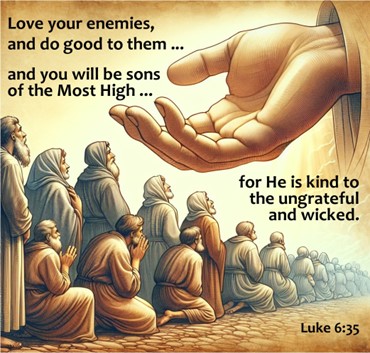 However, I pray that the principles we are sharing are making the stories of the Old Testament clearer. I pray that you can sense in your heart that overflowing joy which comes to us when we read the Scriptures through the revelation of His Son and realize our Father does not harm anyone.
However, I pray that the principles we are sharing are making the stories of the Old Testament clearer. I pray that you can sense in your heart that overflowing joy which comes to us when we read the Scriptures through the revelation of His Son and realize our Father does not harm anyone.
“For God, who said, ‘Let light shine out of darkness,’ made His light shine in our hearts to give us the light of the knowledge of the glory [character] of God in the face of Jesus Christ.” (2 Corinthians 4:6)

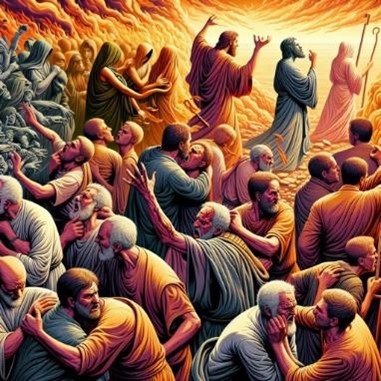
.jpg)
